

Turning back time: ageing reversed in mice - health - 19 December 2013. Imagine if we could turn back time.
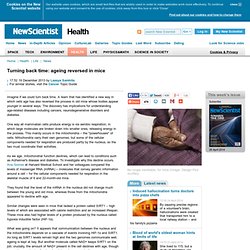
A team that has identified a new way in which cells age has also reversed the process in old mice whose bodies appear younger in several ways. The discovery has implications for understanding age-related diseases including cancers, neurodegenerative disorders and diabetes. Young Blood May Hold Key to Reversing Aging. Two teams of scientists published studies on Sunday showing that blood from young mice reverses aging in old mice, rejuvenating their muscles and brains.
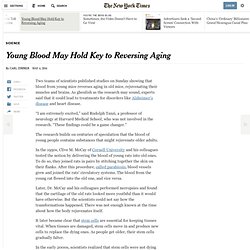
As ghoulish as the research may sound, experts said that it could lead to treatments for disorders like and heart disease. “I am extremely excited,” said Rudolph Tanzi, a professor of neurology at Harvard Medical School, who was not involved in the research. “These findings could be a game changer.” The research builds on centuries of speculation that the blood of young people contains substances that might rejuvenate older adults.
In the 1950s, Clive M. Later, Dr. It later became clear that are essential for keeping tissues vital. In the early 2000s, scientists realized that stem cells were not dying off in aging tissues. “There were plenty of stem cells there,” recalled Thomas A. Dr. The scientists joined old and young mice for five weeks and then examined them. Bucky Balls Could Double Your Lifespan. Mechanism found for destruction of key allergy-inducing complexes, researchers say. Researchers have learned how a synthetic molecule destroys complexes that induce allergic responses -- a discovery that could lead to the development of highly potent, rapidly acting interventions for a host of acute allergic reactions.
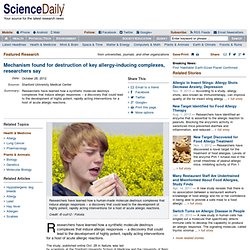
The study, published online Oct. 28 in Nature, was led by scientists at the Stanford University School of Medicine and the University of Bern, Switzerland. Timothy Ray Brown, man thought to be first "cured" of AIDS, says he's still cured - HealthPop. Timothy R.
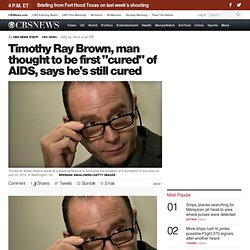
Brown waits to speak at a press conference to announce the formation of a foundation in his name on July 24, 2012, in Washington, DC. Brendan Smialowski/Getty Images (CBS/AP) The first person believed to have been cured of AIDS says reports he still has the HIV virus are false. Cancer is finally cured in Canada but Big Pharma has no interest. CHINESE PLANT COMPOUND WIPES OUT CANCER IN 40 DAYS, SAYS NEW RESEARCH. A little-known plant with a truly bizarre name is now making headlines as a cancer killer, with the compound of the plant vanishing tumors in mice with pancreatic cancer.

Known as the ‘thunder god vine’ or lei gong teng, the Chinese plant is actually integrated into Chinese medicine and has been used for ages in remedying a number of conditions including rheumatoid arthritis. According to the new research out of the University of Minnesota’s Masonic Cancer Center, the thunder god plant compound led to no signs of tumors after a 40 day period — even after discontinuing the treatment. Published in the journal Science Translational Medicine and funded by the National Institutes of Health, even the scientists working on the project were stunned by the anti-cancer properties of the compound. Study leader and vice chairman of research at the Cancer Center explained to Bloomberg how he was blown away by the effects of the simple plant: Solving a traditional Chinese medicine mystery: Discovery of molecular mechanism reveals antitumor possibilities.
Mar. 7, 2011 — Researchers at the Johns Hopkins School of Medicine have discovered that a natural product isolated from a traditional Chinese medicinal plant commonly known as thunder god vine, or lei gong teng, and used for hundreds of years to treat many conditions including rheumatoid arthritis works by blocking gene control machinery in the cell.
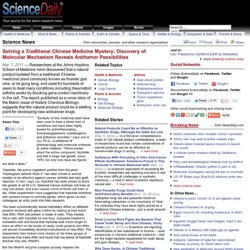
The report, published as a cover story of the March issue of Nature Chemical Biology, suggests that the natural product could be a starting point for developing new anticancer drugs. "Extracts of this medicinal plant have been used to treat a whole host of conditions and have been highly lauded for anti-inflammatory, immunosuppressive, contraceptive and antitumor activities," says Jun O. As Anecdotal Reports of Anti-Cancer Effects from Cannabis 'Oil' Pile Up, Doctors Stress Need to Document Its Effects. March 27, 2013 | Like this article?

Join our email list: Stay up to date with the latest headlines via email. Increasing numbers of people have been using Cannabis “oil” —plant extracts consisting of 50% or more THC and/or CBD— to treat conditions ranging from mild rashes to potentially fatal cancers. Super Sugar Keeps Naked Mole Rats Cancer-Free. Image: Brandon Vick/University of Rochester Although they are quite ugly and confined to a life underground, naked mole rats have at least one attribute that other animals, even humans, might aspire to: They don’t get cancer.
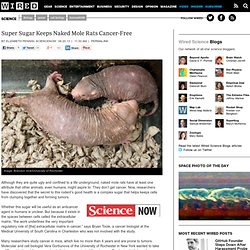
Now, researchers have discovered that the secret to this rodent’s good health is a complex sugar that helps keeps cells from clumping together and forming tumors. Whether this sugar will be useful as an anticancer agent in humans is unclear. But because it exists in the spaces between cells called the extracellular matrix, “the work underlines the very important regulatory role of [the] extracellular matrix in cancer,” says Bryan Toole, a cancer biologist at the Medical University of South Carolina in Charleston who was not involved with the study.
Many researchers study cancer in mice, which live no more than 4 years and are prone to tumors. New drug could cure nearly any viral infection. Most bacterial infections can be treated with antibiotics such as penicillin, discovered decades ago.
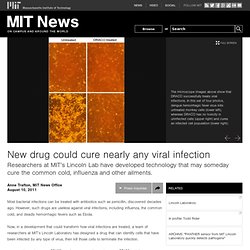
However, such drugs are useless against viral infections, including influenza, the common cold, and deadly hemorrhagic fevers such as Ebola. Now, in a development that could transform how viral infections are treated, a team of researchers at MIT’s Lincoln Laboratory has designed a drug that can identify cells that have been infected by any type of virus, then kill those cells to terminate the infection. The microscope images above show that DRACO successfully treats viral infections. In the left set of four photos, rhinovirus (the common cold virus) kills untreated human cells (lower left), whereas DRACO has no toxicity in uninfected cells (upper right) and cures an infected cell population (lower right). The drug works by targeting a type of RNA produced only in cells that have been infected by viruses.
Antibiotic resistance rising, but FDA can't resist letting industry have things its way. Scientists find Achilles' heel of antibiotic resistant bacteria. “This is really important because drug-resistant bacteria is a global health problem.

Many current antibiotics are becoming useless, causing hundreds of thousands of deaths each year. “Many bacteria build up an outer defence which is important for their survival and drug resistance. We have found a way to stop that happening. "The number of superbugs are increasing at an unexpected rate. This research provides the platform for urgently-needed new generation drugs. " When We Lose Antibiotics, Here's Everything Else We'll Lose Too - Wired Science. A colony of an Actinomycetes bacteria taken at 140x magnification.Image courtesy Biology101.org/Flickr This week, health authorities in New Zealand announced that the tightly quarantined island nation — the only place I’ve ever been where you get x-rayed on the way into the country as well as leaving it — has experienced its first case, and first death, from a strain of totally drug-resistant bacteria. From the New Zealand Herald: In January, while he was teaching English in Vietnam, (Brian) Pool suffered a brain hemorrhage and was operated on in a Vietnamese hospital.He was flown to Wellington Hospital where tests found he was carrying the strain of bacterium known as KPC-Oxa 48 – an organism that rejects every kind of antibiotic.Wellington Hospital clinical microbiologist Mark Jones (said): “Nothing would touch it.
Absolutely nothing. It’s the first one that we’ve ever seen that is resistant to every single antibiotic known.” The Best Birth Control In The World Is For Men. By Jon Clinkenbeard. March 26, 2012, 11:25 AM CDT16.9K If I were going to describe the perfect contraceptive, it would go something like this: no babies, no latex, no daily pill to remember, no hormones to interfere with mood or sex drive, no negative health effects whatsoever, and 100 percent effectiveness.
The funny thing is, something like that currently exists. The procedure called RISUG in India (reversible inhibition of sperm under guidance) takes about 15 minutes with a doctor, is effective after about three days, and lasts for 10 or more years. A doctor applies some local anesthetic, makes a small pinhole in the base of the scrotum, reaches in with a pair of very thin forceps, and pulls out the small white vas deferens tube. Stanford and Venter Institute Simulate an Entire Organism With Software. The scientists and other experts said the work was a giant step toward developing computerized laboratories that could carry out many thousands of experiments much faster than is possible now, helping scientists penetrate the mysteries of diseases like cancer and Alzheimer’s. “You read in the paper just about every week, ‘Cancer gene discovered’ or ‘Alzheimer gene discovered,’ ” said the leader of the new research, Markus W. Covert, an assistant professor of bioengineering at Stanford.
“A lot of the public wonders, ‘Why haven’t we cured all these things?’ Kidney breakthrough: complete lab-grown organ works in rats - health - 14 April 2013.